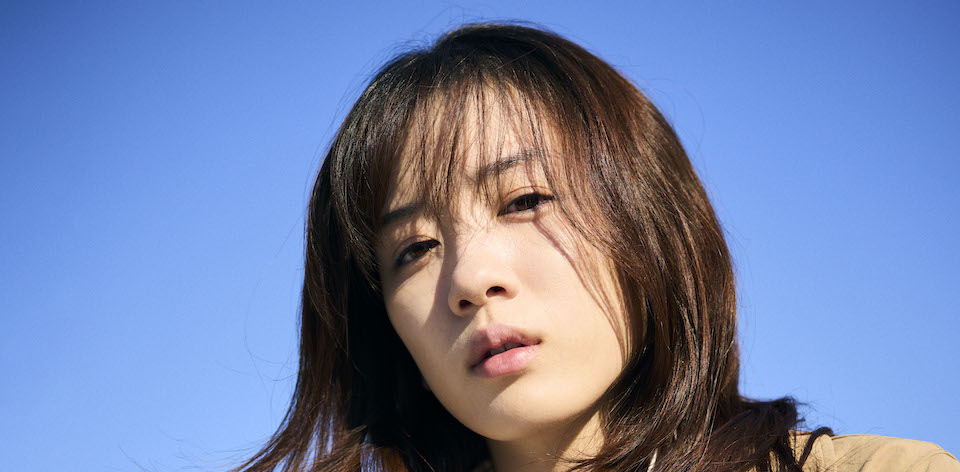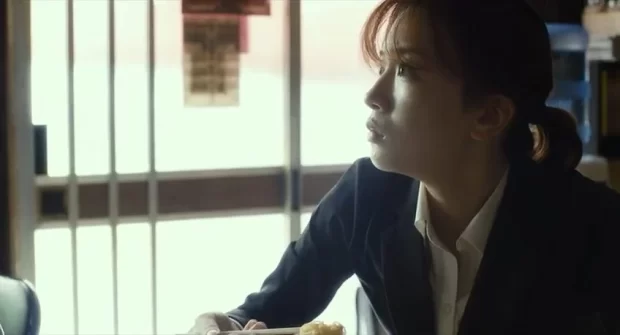Warning: this film discusses self-harm, abuse and suicidal feelings.
Based on the web manga of the same name, Yuki Tanada packs a lot of emotion into a compact space. From the outset, it is clear that MY BROKEN MARIKO (マイ・ブロークン・マリコ) is going to delve deep into territory that is both uncomfortable and heartbreaking. That neither the source material, nor this adaptation, shy away from those harder topics is a testament to a kind of storytelling that recognises the importance of having conversations around suicide and self-harm.
Just as the manga did in its first chapter, Tanada’s film opens on officer worker Shiino (Mei Nagano) having a meal as she learns of the suicide death of her best friend Mariko (played by singularly named Nao). Desperately trying to hold onto the good memories of her friend, she decides to confront Mariko’s abusive father and abscond with Mariko’s ashes. As Shiino journeys to the Marigaoka Cape, a flood of snapshots from the past force Shiino to go through her own passage of self-discovery.
As with the source material, director Tanada plays with non-linear storytelling. As Shiino faces an uncaring boss and a cold world at home, she begins to scroll through her chat history with Mariko. This sparks a series of flashbacks to their childhood and teen years. Shiino reflects on their moments of levity peppered between vivid portrayals of Mariko’s physical and sexual abuse at the hands of her father. Worried the latter will take over the former, Shiino resolves to right past wrongs as best as she can. Here we watch a tragedy and an attempt at redemption unfold simultaneously.
Mei Nagano and Nao are terrific in their dual roles. The latter carries the weight of the titular role, breaking our hearts with lines like “I’m all broken…I don’t deserve happiness. It’s easier to think that way.” If you have ever suffered from depression, or lived with someone who has, then words like these will be all too familiar. Yet it is Nagano who is the driving force of this quietly shattering engine, toting about a lifetime of misplaced guilt alongside the white-wrapped package of Mariko’s ashes. Tokyo Ghoul‘s Masataka Kubota has a supporting role as one of the handful of people who helps her along the way.
The introduction to the original comic says something about this not being a blithe story of redemption or understanding. It’s about raw anger, help from others and the resentment and blame we carry with us as a result of both. Tanada does a remarkable thing with the adaptation, managing to avoid cliché happy endings and uplifting narratives while crafting something that is true to itself and subtly affirming in its own way. Even though the ending feels a little too convenient perhaps, I could have easily watched a film (or series) four times as long, although I may have been an emotional wreck by the end of it.
If you or anyone you know needs help or just someone to talk to, here are some excellent services.
- Lifeline on 13 11 14
- Kids Helpline on 1800 551 800
- MensLine Australia on 1300 789 978
- Suicide Call Back Service on 1300 659 467
- Beyond Blue on 1300 22 46 36
- Headspace on 1800 650 890
- QLife on 1800 184 527
- Crisis Text Connect (US)
2022 | Japan | DIRECTOR: Yuki Tanada | WRITERS: Kosuke Mukai, Yuki Tanada | CAST: Mei Nagano, Masataka Kubota, Nao | DISTRIBUTOR: Happinet Phantom Studios, Kadokawa Pictures, Fantasia Film Festival | RUNNING TIME: 85 minutes | RELEASE DATE: 14 July – 3 August 2022 (Fantasia)







